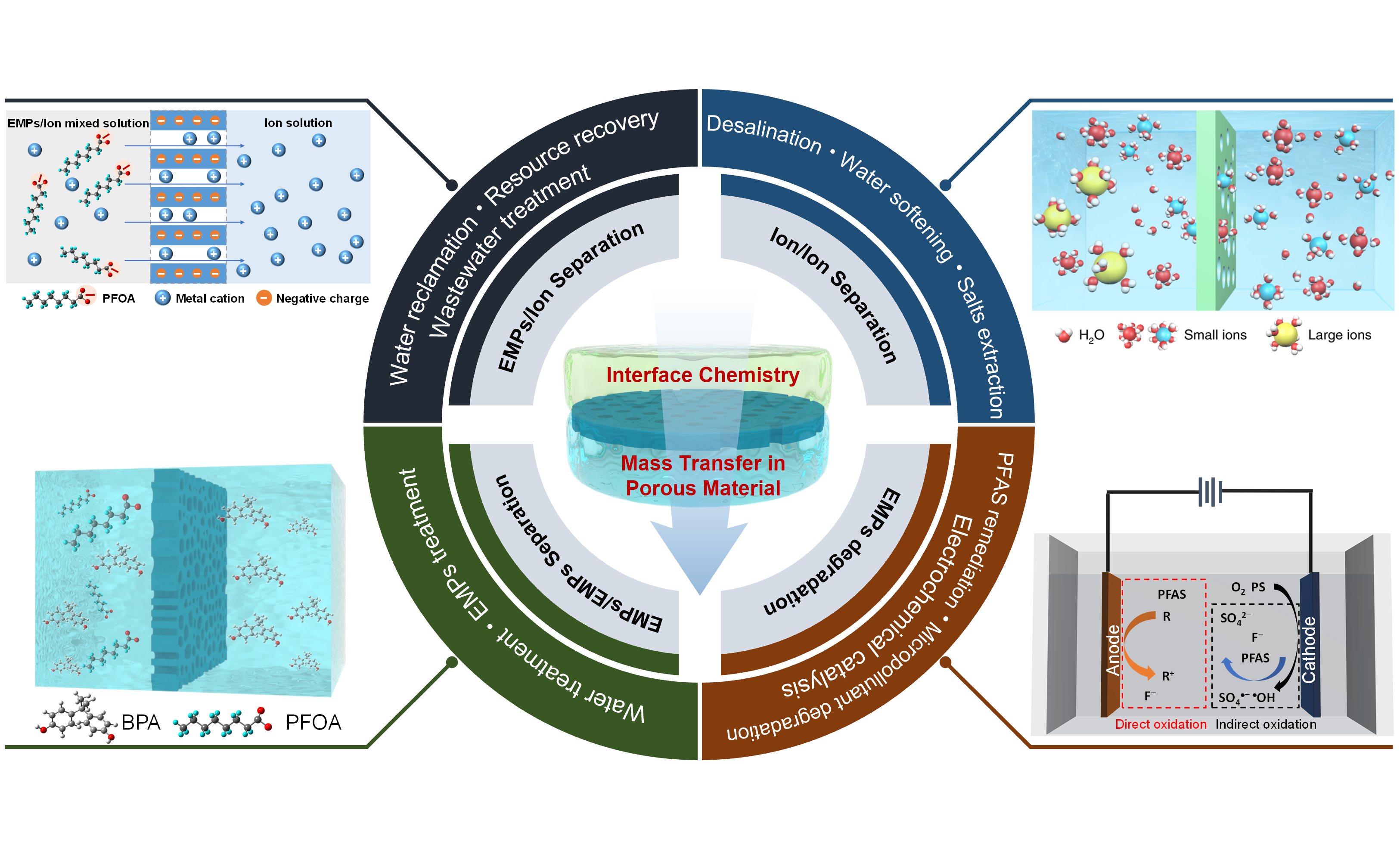
Advanced Materials and Interfaces for Energy-Efficient Separations and Environmental Sustainability
The Han Lab focuses on the rational design, synthesis, and characterization of multi-scale nanostructured membranes/channels and functional interfaces for applications in energy-efficient molecular separations and environmental sustainability.
Research Interests
The Han Lab focuses on the molecular-level design, synthesis, and characterization of multi-scale organic and inorganic pores/channels and functional interfaces that can enable effective discrimination of molecules as well as understanding the nontrivial structure–property–performance relationships leading to improved separation in order to rationally design future materials. Our research is targeted towards developing know-how on artificial porous materials and “smart” interfaces to tackle and address the recalcitrant challenges pertaining to separations and environmental sustainability. The ultimate goal of our research is to develop high-throughput, energy-efficient, and exquisitely selective separation materials and devices. Specifically, our research is currently oriented along three main axes:
1. Multi-scale pores/channels materials
Rational design and development of hierarchically porous materials that were inconceivable just a few years ago are now within reach because of the methodological and technical advances in materials synthesis, experimental characterization tools, and molecular modeling and simulation. Biological “smart” gates and channels have also inspired us previously unattainable understanding and control on the design and fabrication of artificial nanochannels for regulating the selective transport of water and ions. Our research in this devotes significant efforts to synthesizing revolutionary pores/channels materials through innovative synthetic strategies and to developing fundamental methods for studying permeability, selectivity, and diffusion of ions and small molecules in these nanochannels. The research emphasizes the theoretical and mechanistic understanding of mass transport that leads to better insights into fundamental knowledge of how complex mixtures can be separated in a controlled manner. We are currently particularly interested in the molecular-level design, synthesis, and characterization of nanoporous materials that include membranes and adsorbents are very much in this spirit for addressing the pressing challenges in molecular separations by bridging the gap between material science and scalable advanced separation devices.
2. Interfacial science
For many separation processes, external and internal interfaces and interfacial regions play a decisive role in critical performance parameters such as flux, selectivity, and fouling. Fine control of interfacial phenomena is key to the effective implementation of separation techniques. Our research efforts in this area center on developing new materials and approaches to achieve more refined control of interfacial properties for manipulating mass transfer and partitioning as well as generating molecular-level insight into interface structure and interfacial forces. We are particularly interested in understanding and controlling the interactions at the solid-solid interface to create effective composite materials for separations such as defect-free mixed-matrix membranes and the interactions at the solid-liquid interface to facilitate the precise discrimination among molecules selectively based on small differences in size, shape, or chemical functionality. A dramatic example of the use of interfacial control to improve separation processes is to utilize exceptional surface wettability and interfacial confinement of porous materials, through the engineered application of polymers and nanomaterials, to facilitate selective recognition, adsorption, and transport of complex molecules.
3. Energy-efficient separations for environmental sustainability
Separations have broad social, economic, sustainability, and environmental stewardship implications. Separation technologies are critical to almost every aspect of our daily lives, from the clean water and air we use to the medications we take. Materials-driven separation and purification technologies have the great potential to dramatically drive down the energy use, cost, and environmental impacts of the traditional separation processes that rely on the vaporization of one or more of the chemical components. Given the importance of mass- and energy-efficient separations, our materials and interfaces research are tailored towards addressing large-scale and impactful challenges that sit at the forefront of a variety of gas and liquid phase separations. Particularly, our research aims to substantially alleviate the energy penalty and increase the environmental sustainability associated with separations. Beyond making materials, we strive to transform enabling materials from the lab into scalable, modular devices that can then be sent out into the field. These challenging goals are carried out in collaboration with academic and industrial colleagues. Ongoing research topics revolve around six main themes:
Tunable microporous and mesoporous materials with multi-scale pores/channels
Functional interfaces that can facilitate separations
Materials for desalination and water purification
Highly selective and robust membranes for organic solvents filtration
The fundamental understanding of how matter interacts at the interface
Performance of separation materials in complex and highly variable environments
Sponsors of our research include the Nankai University and the National Natural Science Foundation of China (NSFC)
